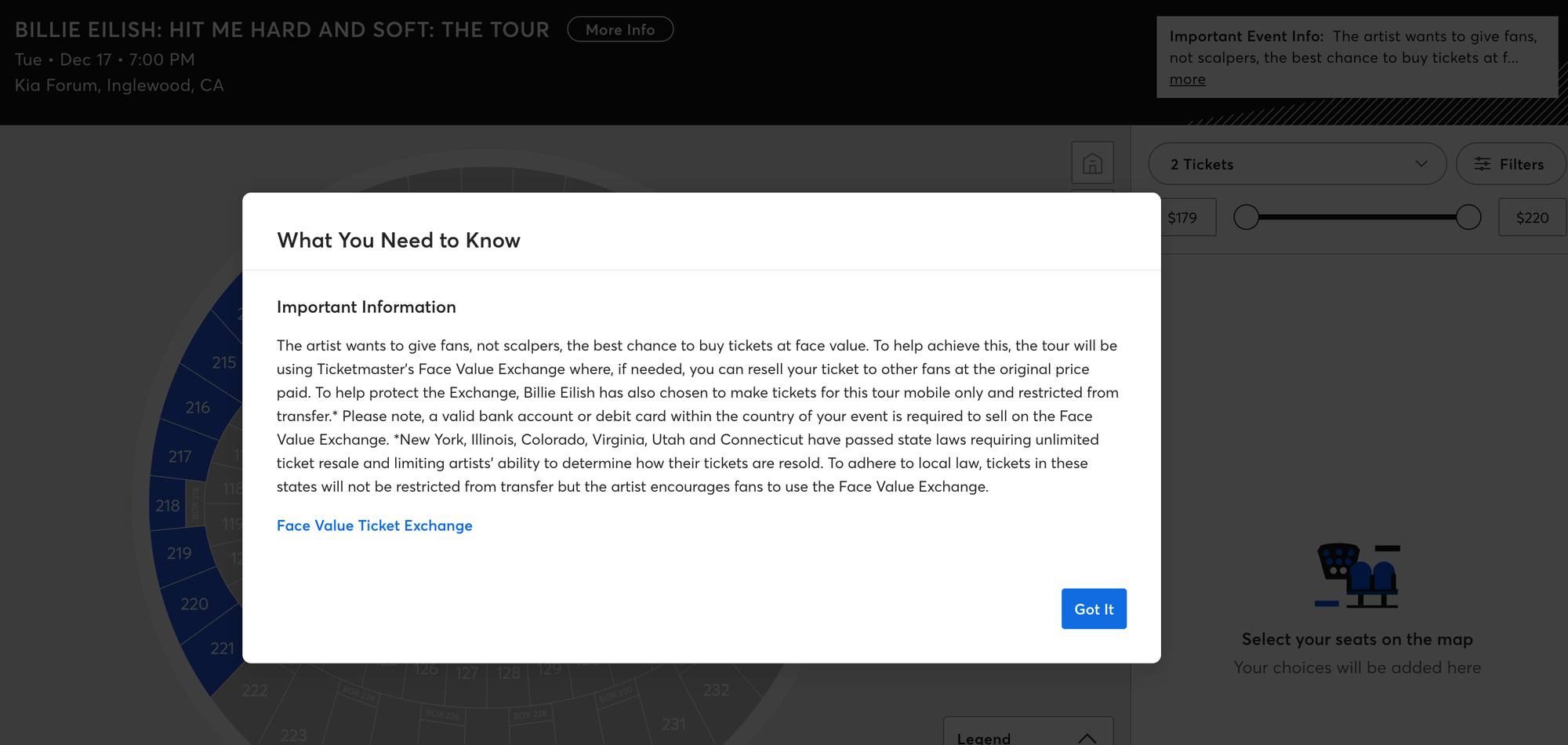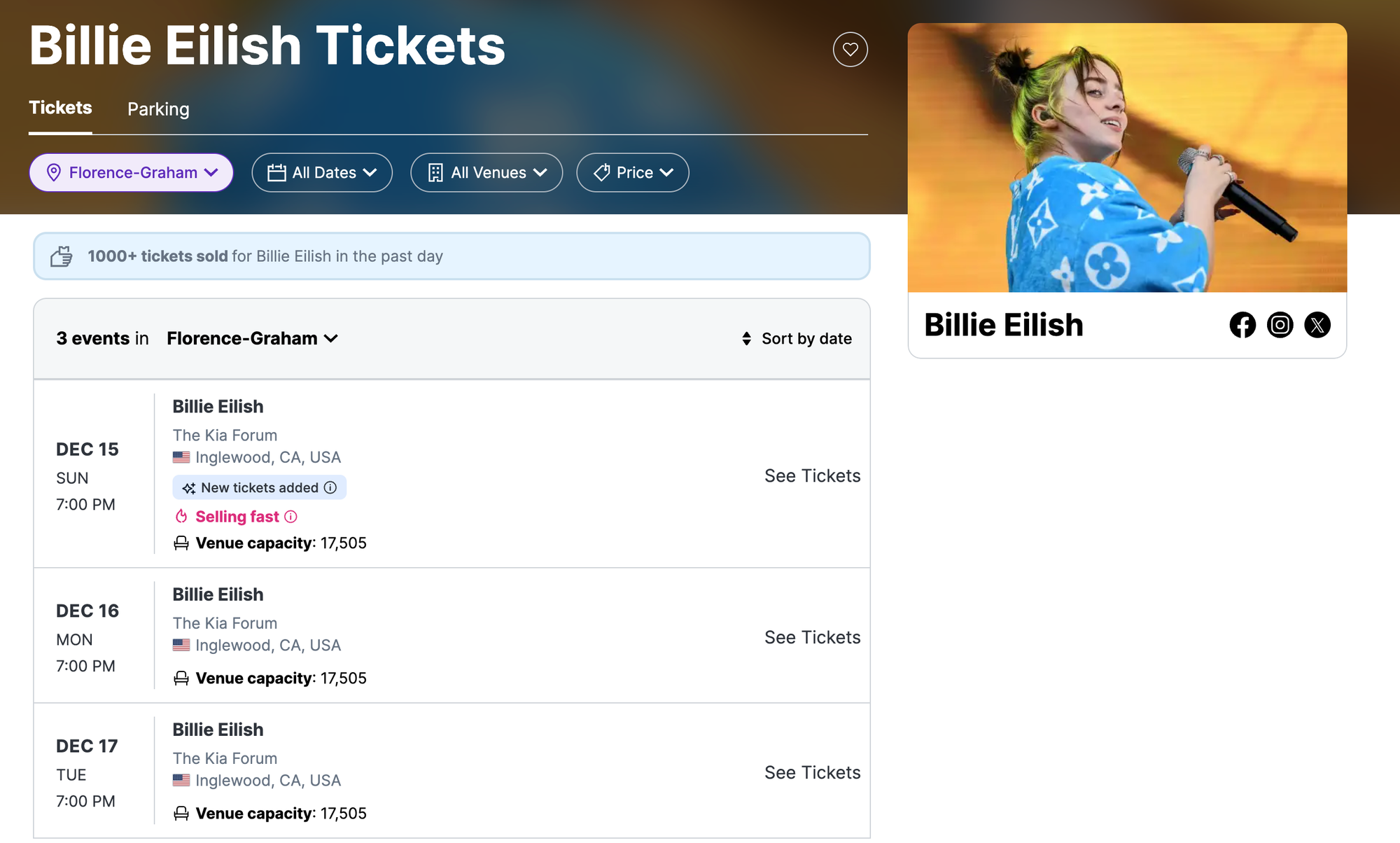When tickets for Billie Eilish’s Hit Me Hard and Soft tour went on sale last week, buyers were shown a note from Ticketmaster that read “the artist wants to give fans, not scalpers, the best chance to buy tickets at face value,” and warned fans that they would only be able to transfer tickets at face value on a Ticketmaster platform called the Face Value Exchange. “Eilish has also chosen to make tickets for this tour mobile only and restricted from transfer,” the message reads, meaning PDF and “hard” tickets are not available, and that the tickets will be issued via the Ticketmaster app.
Eilish was lauded for this move, which seems like it would make it essentially impossible for scalpers to sell her tickets. But, as I’ve noted before, scalpers have solved almost every restriction that Ticketmaster has implemented. If you check third-party ticketing sites, you will see that despite Eilish’s restrictions, there are many scalpers selling tickets on the secondary market.
This segment is a paid ad. If you’re interested in advertising, let's talk.

You've heard of Robinhood, the financial investment application unicorn. Now you can get even deeper by upgrading to their premium product, Robinhood Gold, a new suite of powerful tools, data, and features designed to take your investing to the next level. Robinhood Gold also offers competitive yields, 3% IRA matching on every dollar, bigger instant deposits, enhanced insights, and lower margin rates.
Get 5.0% APY. Free for 30 days, then $5/month when you sign up. Now let's make the most of your money already!
A ticket broker source told me “brokers have figured it out. Don’t think any anti-scalping measures could really stop them they will always find a way.” The method that will be used with Eilish is called “transferless links” or “wallet links,” the source said. A separate broker I talked to explained how this method works, and said they have used it in the past to defeat various Ticketmaster anti-scalping restrictions.
Over the years, the actual mechanisms for transferring tickets from a ticket broker to a customer have changed. For years, Ticketmaster mailed you “hard tickets,” which scalpers then sold in person or mailed to customers. Then came TicketFast, which were PDF tickets. PDF tickets were regularly faked, and so tickets now sometimes have time-based QR codes or barcodes that are constantly changing. Normally, these tickets can be uploaded into the backends of system like StubHub or other ticket broker sites, and can be transferred to a customer relatively easily. But it’s impossible to do this in the “normal” way when an artist like Eilish makes the tickets supposedly “untransferable.”
The brokers told me that there are several ways “untransferable” tickets can be transferred. Not every method works for every show, but brokers are clearly confident that one of them will work for Eilish’s shows, because there are thousands of tickets for sale on third-party websites at the moment.

‘Non Transferable’ Tickets Are Often Easily Transferable
Many tickets that are supposedly “non-transferrable” actually become transferrable shortly before the concert actually happens. This is because thousands of people buy tickets on third-party sites unconnected to Ticketmaster, don’t understand how or if they are going to be able to get into the concert, and begin calling Ticketmaster customer support asking if they are going to be screwed out of going to the concert.
Rather than deal with many upset fans and ruining the symbiotic relationship Ticketmaster has with ticket brokers, the “restriction” on ticket transferring if often lifted sometime in the days leading up to an event, and tickets can be transferred normally. This happened recently with the band Sleep Token, which had the exact same “untransferable” ticket restrictions Eilish does. Many upset fans who bought tickets on the secondary market and then found out they would only get the tickets the day of the show or worried they wouldn’t get them at all. There has been much freaking out from fans who bought tickets on the secondary market, thought they wouldn’t get them, then were able to get their tickets transferred to them the day of the show without jumping through any hoops whatsoever. Ticketmaster acknowledged a request for comment but did not provide one.
A side note: Many Billie Eilish tickets come with zero transfer restrictions at all. New York, Illinois, Colorado, Virginia, Utah, and Connecticut have all passed laws that prohibit artists, venues, and primary ticket sellers like Ticketmaster from placing any restrictions on the resale of tickets. These laws were lobbied for by groups representing ticket brokers and secondary market platforms in the name of “fan freedom.”
Apple Wallet & Google Wallet
If the transfer restriction isn’t lifted, tickets can often be moved off of Ticketmaster and onto Apple Wallet or Google Wallet. Once the tickets are initially released from Ticketmaster to a customer, they can log into the Ticketmaster app and add the tickets to their Apple Wallet or Google Wallet. From there, the tickets can be transferred between phones via AirDrop or a text message link. This is a method I have previously used to get “untransferable” tickets from a friend’s Ticketmaster account to my own phone.
Venue Meetups
Transferring tickets via Apple Wallet doesn’t always work, but Apple Wallet and Google Wallet are often involved in more difficult ways of transferring tickets, too. Billie Eilish tickets available for sale on StubHub have a disclaimer that says “to gain access to the event, you need to be accompanied by the original buyer of tickets.” What this means in practice is that buyers might need to meet up with a seller outside of the venue. The seller will then log into their own Ticketmaster account on a buyer’s phone and download the tickets from the Ticketmaster app onto Apple Wallet or Google Wallet, effectively “transferring” the tickets to the buyer. The seller will then log out of the Ticketmaster account on the user’s phone, and the transfer is done.
This is an easier method of bypassing ticketing restrictions than an anti-scalping strategy called “Paperless Tickets,” which were used a decade ago and required the buyer to swipe the credit card used to buy the tickets at the gate to get into the venue. Scalpers got around this by “burning” a ticket on themselves. Essentially they would buy four tickets, sell three of them, and literally walk into the venue with the buyers of the tickets. Scalpers would also use prepaid debit cards to buy the tickets and then simply mail the prepaid card to the buyer.

Throwaway Accounts
As we’ve previously reported, ticket brokers have started creating many different Ticketmaster accounts and have also started buying “aged” Ticketmaster accounts on the black market. To do this, they use burner phone numbers and third-party SMS verification (because Ticketmaster now requires a cell phone number to make an account). Some brokers have started essentially treating Ticketmaster accounts as throwaway assets. They will buy tickets for a single event on an account, then will basically sell access to that account to a ticket buyer. They give the ticket buyer the login info for the Ticketmaster account, and the buyer uses those login credentials to get the ticket. The seller then either does a password reset to regain access to the account, or simply never uses the account again. Essentially, the seller is transferring the entire Ticketmaster account, not just the ticket.
High Ticket Prices and Multiple Shows Make Scalping Unprofitable
I am explaining these strategies because I think it is useful to understand how the ticket broker industry works, and to understand that even when an artist says they are combatting scalpers, that does not necessarily stop them. I have previously argued that some of Ticketmaster’s anti-scalping strategies, like the “virtual waiting room” and the “Verified Fan” system actually help scalpers because they are better at buying tickets than actual fans are.
Ticketmaster, venues, and, sometimes, artists themselves rely on ticket brokers to some degree because they buy tickets for shows that otherwise may not sell out or buy season tickets for sports teams where the vast majority of games are unprofitable on the secondary market. Ticket brokers themselves argue that they are making tickets available for hard-to-buy shows and are therefore helping fans get tickets to shows that they otherwise wouldn’t be able to go to. This is perhaps a cynical argument, but it is the case that when artists fully restrict ticket transfer, fans who are trying to buy tickets on the secondary market get mad.
The thing that actually makes scalping unprofitable is by having high initial ticket prices, which obviously prices out many fans but also adds risk to ticket brokers, and playing multiple shows on multiple days in the same city.
Eilish is generally doing this, which perhaps explains why many of her shows have not sold out. For example, you can still buy tickets in the upper levels for her shows at Madison Square Garden in New York City and for her shows at the Kia Forum in the Los Angeles area. These upper-level tickets cost $189.50 per ticket before fees at the Kia Forum. This is very expensive for an upper-level ticket, which some of her fans have pointed out. A very limited number of tickets were available at $69 face, but tickets at this “price break” sold out instantly at all venues. Eilish is playing three shows at The Kia Forum and is playing three shows at Madison Square Garden.
She is playing multiple shows at most venues on the tour, and secondary market ticket prices for those dates on the tour have generally hovered somewhere around face value, indicating that scalpers who bought tickets are probably going to lose money on a lot of the tickets they bought for this tour once fees are factored in. Cities where she is playing only one show are generally selling out, and ticket prices are higher on the secondary market. She is playing only one show in Boston, for example. Tickets for that show are sold out, and the cheapest tickets on StubHub are nearly $300, suggesting that those shows will be profitable for scalpers.
Artists are seemingly realizing that if they want to beat scalpers, they need to either increase prices or play more shows. This strategy works for most musicians in the world with the possible current exception of Taylor Swift, who is playing multiple shows in gigantic venues all over the world. So far, tickets for the second round of American shows on her Eras Tour are selling for more than the first set of shows; it is currently impossible to get a ticket for less than $1,000 anywhere in the United States, and it seems like she would need to add many, many more shows in order to make a significant dent in secondary market ticket prices.
The musician Jeff Rosenstock, for example, recently announced an “infinite” string of shows in Brooklyn at a venue called the Warsaw: “I know our last few shows in the area have either been a bit pricey, at a venue no one likes traveling to, or sold out very very quickly. So we wanted to do something special in Brooklyn, something where everyone can go. Starting August 21st we're gonna play a bunch of shows at the Warsaw, a venue that has been home to a lot of special moments in my life. Here's how it's gonna work - tickets for 8/21 are on sale tomorrow at 12 PM. If that show sells out, we'll put up tickets for the next night, and so on and so forth until no one wants to see any more of us.”


